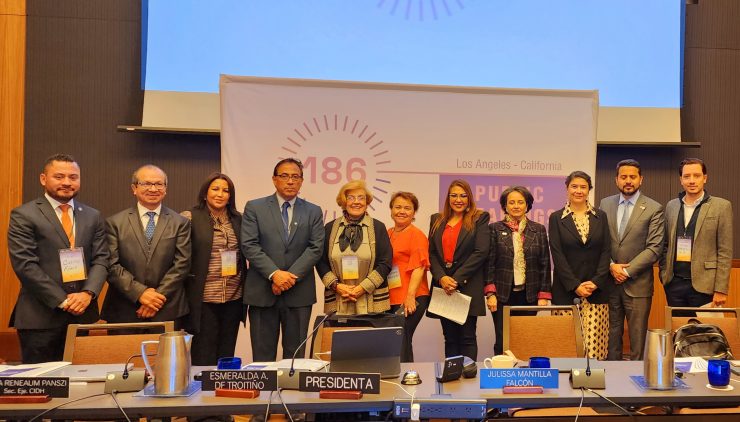This website uses cookies so that we can provide you with the best user experience possible. Cookie information is stored in your browser and performs functions such as recognising you when you return to our website and helping our team to understand which sections of the website you find most interesting and useful.
Vance Center Supports Latin American Judges at IACHR Hearing
March 2023As part of the Vance Center’s efforts to support judicial associations in Latin America, raise awareness about challenges and attacks on judicial independence, and activate regional protection mechanisms, Latin America Policy Director Jaime Chavez Alor traveled to Los Angeles, California, to support seven judges presenting at the 186th Period of Sessions of the Inter-American Commission on Human Rights (IACHR).

Judges and CIDH Commissioners at the March 9 hearing on threats to judicial independence. (Photo credit: Jaime Chavez Alor)
The Vance Center, in collaboration with other international organizations, submitted a request for the hearing on behalf of the Latin American Federation of Magistrates (FLAM) and the Central American Federation of Judges for Democracy (FECAJUD) in October 2022.
At the hearing on March 9, judges from Bolivia, Costa Rica, El Salvador, Guatemala, Honduras, and Uruguay, including FLAM President Adriana Orocú and FECAJUD President Haroldo Vásquez, appeared before the Commission to report on attacks against judicial independence and emphasize the need for the Commission to engage with governments to improve conditions for judges. The judges presented printed copies of assessments on independence in the represented national judiciaries produced by the Vance Center, FECAJUD, and FLAM over the last year, and outlined a range of challenges and threats affecting their job security, labor conditions, physical safety and integrity of the judicial system, including:
- Judge Carlos Ruano from the Guatemalan Association of Judges for Integrity (AGJI) shared first-hand accounts of persecution against justice operators working on cases involving corruption, human rights violations, and organized crime in Guatemala. Judge Ruano noted that more than 25 Guatemalan justice operators have gone into exile since 2021 due to fears for their safety, with at least 15 of them submitting requests to the Commission on their cases, and cited a 2022 Vance Center report on criminalization of Guatemalan justice operators in his intervention.
- Former Judge Sidney Blanco from El Salvador explained that he was dismissed in 2021, after 25 years in the judiciary, due to a legal reform that arbitrarily removed all judges over 60 years old.
- Judge Grenny Bolling from the Association of Magistrates of Bolivia highlighted the precarious situation of the estimated 40 percent of Bolivian judges working temporarily, leaving them vulnerable to arbitrary removal and challenges due to insufficient resources allocated to the judiciary.
- Judge Orocú reported in her capacity as President of the Costa Rican Association of Judges on legislative overreach in pension and retirement reforms and salary cuts that have resulted in an increase by more than 130 percent in resignations among qualified judicial staff in the last few years.
- Judge Fanny Bennett, President of the Association of Judges for Democracy in Honduras, described how the lack of an adequate judicial profession law has led to arbitrary sanctions and dismissals of judges and auxiliary personnel for political reasons.
- Judge Leonardo Méndez from the Association of Magistrates of Uruguay raised concerns about the secretive and anonymous nature of judges’ evaluations for promotions.
The judges’ intervention concluded with specific requests, including establishing a special rapporteur or monitoring mechanism for judicial independence, timely processing of precautionary and protection measure requests for justice operators, and including meetings with judges from independent associations in the Commission’s country visits and work meetings.
In response, IACHR Commissioners Esmeralda Arosemena de Troitiño, Carlos Bernal, Julissa Mantilla, and Joel Hernández expressed concern and asked questions about gender policies in the judiciary, administration of the judiciary, and how attacks on judicial independence have a differentiated impact on women judges. The Commissioners called for an inter-American dialogue on judicial independence regarding seven specific topics, including selection criteria, changes in salaries, the use of temporary appointments to bypass the judicial career, and the principle of legality in dismissal of a judge.
See the public hearing video, the assessments from Central America, and the assessments on Bolivia and Uruguay.


